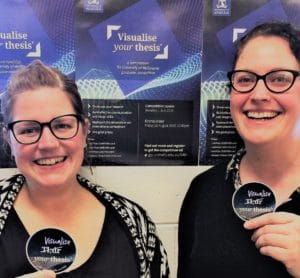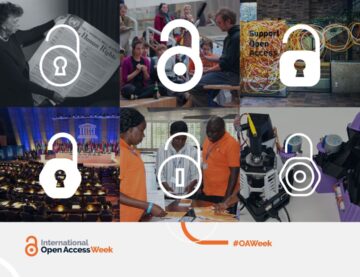Subscribe to our newsletter
Self Promotion for Introverts: Getting Your Research Message Out There While you Stay in

Imagine yourself as a graduate researcher (or maybe you are, in fact, one?!). Your project is going well and you want to tell the world about your amazing research project, results or discoveries – but the moment you start talking to your family or friends about it their eyes glaze over, and they are lost in the jargon of your discipline. Or maybe you have the opposite problem: you’ve been asked to present on your work but speaking in front of an audience is a daunting prospect. Or maybe you *want* to present, but juggling conference/symposium attendances with your research and other commitments is just impossible. Wouldn’t it be great to have a short and sweet summary of your research – an elevator pitch – that can easily be shared?
The University of Melbourne’s Visualise Your Thesis competition (VYT) challenges graduate researchers to come up with exactly such an “elevator pitch”, in the form of a succinct and attractive audio-visual, digital object. Competitors are given 60 seconds to distil the central theme of their research and present it to a non-specialist audience. Entrants can use images, sound, animation and video to convey their work. VYT evolved from the poster competition ubiquitous to so many academic conferences, first with a nudge to e-posters, then on to the dynamic display entries that form the basis of today’s competition. Past entrants have made great use of their pitches to tell their research story to the wider world on their blogs, as tweets, or linked in email signatures. Originating at the University of Melbourne, in 2018 the VYT competition was rolled out to 11 other universities from Australia, Hong Kong and South Africa, resulting in a finalists’ showcase. Cooperation and feedback from these early-adopter institutions provided an excellent opportunity to road-test and refine this emerging competition.
2019 will be a big year for VYT. In the inaugural 2019 Visualise Your Thesis International Competition, which will be held online, the winning entries from local competitions – to date, 16 universities have registered to participate – will battle it out for a chance to take home AUD$5,000 (1st prize), $2,000 AUD (2nd prize) or $1,000 AUD (3rd prize). The winners will be announced at eResearch Australasia 2019, taking place in Brisbane in late October.
The VYT team are also thrilled to partner with Digital Science. As the competitions first official sponsor, Digital Science makes available a designated VYT figshare repository which will host the International Competition entries.
“Digital Science’s vision for supporting innovation and access for emerging research, and researchers, is a perfect fit for VYT. The VYT Figshare repository will allow entrants to share their digital creations with some permanence, track engagement and impact, and understand reuse permissions.” says Jennifer Warburton, Manager – Research Publications & Programs at the University of Melbourne and founding member of the VYT competition.
There is still time to get involved!
If you are a university administrator who would like to offer VYT to your graduate researchers, register your institution to receive a detailed competition pack which outlines how to run a local competition, and is full of support resources and materials. But be quick: registrations for institutions for 2019 close on 7 July.
If you are a graduate researcher and would like to take part, check here. If your university is running a local competition this year. If they are not registered yet, forward the competition details to your Graduate Research Office or Library.

Just want to come along for the ride? Follow VYT on Twitter, check the Visualise Your Thesis website for key dates, and keep an eye on the VYT figshare site – content coming soon!
Got questions or want to find out more? Email the VYT team on visualise-thesis@unimelb.edu.au.
Guest post by Christina Ward (Liaison Support Librarian, Law) and Dr Julia Kuehns (Research Liaison Librarian, Arts), Scholarly Services, University of Melbourne.



